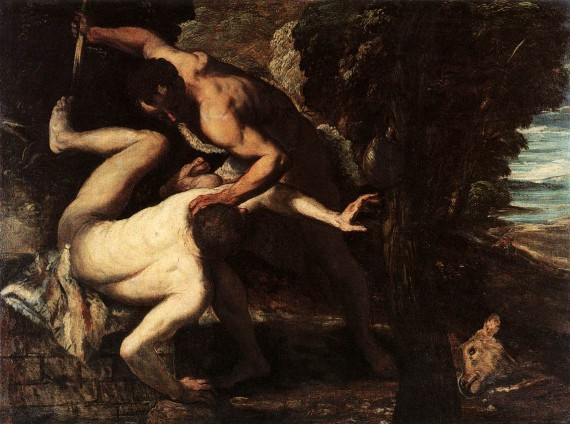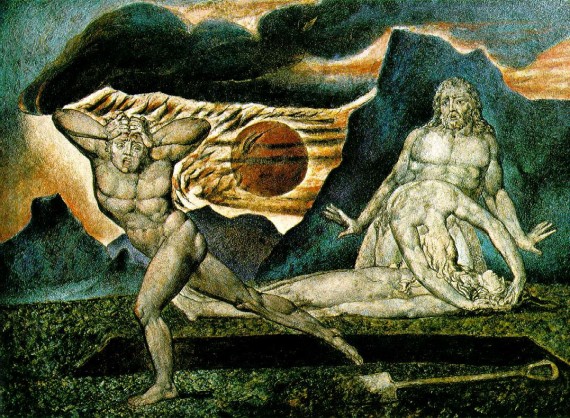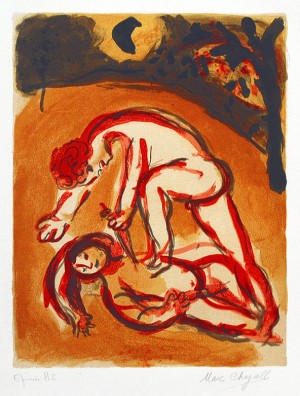I have a new eBook coming out soon. The following post hits on one of the themes I write about in this book. To get this new book when it comes out, make sure you have subscribed to receive my blog posts and eBooks by email.

There is a reason why the very first murder in the Bible is a fratricide – a murder between brothers. What is that reason?
Because every murder is a murder between brothers. When Cain murdered his brother, Abel, it represented every murder in history.
When one person murders another person, they are murdering their brother or sister. Every homicide is fratricide.
But the significance and symbolism goes deeper still, especially for those of us who have never murdered anybody.
The Cycle of Murderous Revenge
The blood of Abel cries out from the ground for justice, for revenge. This is the cycle of murder which is behind every murder as well. Most murderers do not think of themselves as murderers, but simply as vigilantes of justice. Their murder of another person was justified. They were righting a wrong, killing a criminal, or invoking vengeance upon some injustice. Every murderer is able to justify his own murder.
This we also see in Genesis. After Cain kills his brother, Lamech get injured by a boy, and retaliates with murder. But he feels his murder was justified, and says that if anyone tries to re-retaliate against him by killing him, vengeance will come upon them seventy times over (Gen 4:24). The cycle of vengeance and retaliation goes from hurt to murder to mass-murder, and eventually, to the place where “the entire earth was filled with violence” (Gen 6:5, 11).
But the cycle of violence did not stop with violence covering the earth. Whereas a rivalry between brothers led to the murder of one (Genesis 4), and the rivalry between all people led to murderous violence among all (Genesis 6-9), humanity eventually turned their rivalry upon God Himself and sought to place themselves upon His throne (Genesis 11:1-9). But the only thing that ever resulted from all this murderous rivalry and violence was death (Genesis 5), death (Genesis 10), and death (Genesis 11:10-32).
This is why the only proper response to murder is forgiveness. Without forgiveness, murder leads to a cycle of violence that ends only in annihilation.
But who can have the courage (and wisdom) to respond to murder with forgiveness? Nobody! At least, I do not think I have the courage to forgive those who murdered one of my loved ones, or to forgive those who attempt to murder me. In this world, the only way, it seems, to keep from being murdered is to be stronger than the one who wants to murder you, and to murder him before he murders you.
And yet, we do have Jesus as our perfect example of how to treat those who murder us. As Jesus was being murdered on the cross by His brethren, He asked God to forgive them.
This is why the author of Hebrews says that Jesus “spoke a better word than the blood of Abel” (Heb 12:24). And what word did Jesus speak as His own blood was being spilled by His brethren? Though the blood of Abel cried out for vengeance from the ground, as the blood of Jesus poured from His veins on the cross, He cried out, “Father, forgive them, for they know not what they do!” (Luke 23:34).
Can we do this? I am not so sure.

A Second Look at the First Murder
Maybe it begins by going back to look once again at the first murder, the founding fratricide. If we look at what happened when Cain murdered his brother, we may be able to get a glimpse of our own hearts also when we have murderous hate for others.
If we go back and look at why Cain murdered his brother, we discover that it was because Cain was trying to please and appease God. His parents had “stolen” God’s fruit, and Cain, as the “promised seed,” was the one who would get his family back into God’s good graces. So He became a farmer and when he received his harvest, he tried to give God back His fruit.
And God’s answer to Cain was, “Sin is crouching at your door, and it will destroy you.” What sin was that? The sin of trying to make amends with God!
In essence, God looked at Cain’s offering of fruit and said, “I don’t want the fruit. You do not understand. I am not angry at you. I do not want sacrifices and offerings. I just want you. I want to live life with you. Go ahead, keep the fruit for yourself. Eat it. Enjoy it. It’s yours.”
But Cain believed that God’s justice had been violated, that His honor had been destroyed, and Cain believed that something must be done to restore God’s honor, and make the world “right” once again. Cain believed that justice must be served, that order must be re-introduced, and that satisfaction must be made.
Most importantly, Cain believed it was his responsibility to make things right, to restore order, and to serve justice. This feeling is the foundational emotion for murder.
For when Cain saw that God had a good relationship with Abel, Cain believed that Abel would become the one who would rescue his family from exile. He didn’t like to have a rival, and so he murdered his brother.
In this way, God’s promise that eating the forbidden fruit would lead to death was fulfilled in the first generation of humans after Adam and Eve were exiled from the Garden of Eden. And it was a murder of brother against brother. This murder of brothers began a cycle of contagious violence, murder, and death that spun out of control and enveloped the whole earth.
As such, it is not an exaggeration to say that violence is the most prominent theme in the Old Testament text. No human activity is mentioned as frequently in the Old Testament as the activity of violence. Raymund Schwager states that the Old Testament books “contain over six hundred passages that explicitly talk about nations, kings, or individuals attacking, destroying, and killing others. … No other human activity or experience is mentioned as often” (Must There be Scapegoats? p. 47).
Yet there is something more troubling than this.
Does God retaliate against violence with more violence?
 For all the mentions of human violence, references to divine violence appear almost twice as often.
For all the mentions of human violence, references to divine violence appear almost twice as often.
Again, Schwager provides the statistics: “The theme of God’s bloody vengeance occurs in the Old Testament even more frequently than the problem of human violence. Approximately one thousand passages speak of Yahweh’s blazing anger. … No other topic is as often mentioned as God’s bloody works. A theology of the Old Testament revelation that does not specifically deal with this grave and somber fact misses from the very start one of the most central questions …” (Must There be Scapegoats? p. 55).
What are we to make of this?
How can Jesus call us to bless and forgive our enemies when it appears from Scripture that God does the exact opposite? Furthermore, how can Jesus be the exact representation of God, when everything Jesus taught about God seems to contradict what we see about God in the Old Testament?
A straightforward reading of the Old Testament text seems to indicate that as violent as humanity can be, God outdoes us all; God is more bloody and violent than all humanity combined.
And if this is the case, is it any wonder that humans are murderously violent — just like their God in whose image and likeness they are made?
Between the violence of humanity and violence of God, it is obvious that “violence is the most central theme in the Old Testament” (Must There be Scapegoats? 66).
But maybe, just maybe, despite all our scholarship, studies, and sermons, we have missed the main revelation of the Bible. Maybe, just maybe, the Bible we want is not the Bible God gave us. Maybe, just maybe, the Bible is not a book of spiritual devotion or “a morally reassuring manual of religious piety” (Bailie, Violence Unveiled, 135).
Maybe, just maybe, we have completely ignored the main truth of Scripture.
The Most Ignored Truth in Scripture
And what truth is that?
That we are the violent ones, and there is no violence in God at all.
That God appears violent because we have made Him to be the scapegoat for our own violence.
That God appears violent to us only because we do not want to admit our own violence and so blame Him for it. In our scapegoating violence, we have made God the universal scapegoat for all violence.
We have, each one of us, killed our brothers. And the blood of every victim in Scripture and in history cries out from the ground. And when God appears and says, “What have you done?” we reply, along with Cain, that we are the victims, that we are the ones God has wronged, that if He would treat us more fairly, life would turn out better.
In our hearts, we secretly desire to become God. We secretly know in our hearts that if we were running the world, we could do a better job than God. In our hearts, we secretly believe that God has wronged us, not treated us fairly, and shows favoritism to others. And so we grow in our resentment towards God. We secretly wish that we could replace God.
With this secret desire in our hearts, we set out to “be God” to the world by doing the things He doesn’t seem to be doing. We try to make things right. We try to enact justice. We try to retaliate against wrongdoers.
And when God whispers into our hearts, “Be careful! Sin is crouching at your door!” we try to protect ourselves from this sin by “righteously” killing “God’s rivals,” who are really only our rivals.
When we place ourselves up as the bringers of peace, as God’s spokesman in the world, as the ones who will restore humanity to the garden, and then God seems to favor someone else who is “doing it all wrong,” we get jealous and envious, and we set out to kill and destroy them so that we ourselves do not lose our privileged position.
This desire to be God leads to a rivalry against others, which leads to murdering our rivals, as we think God should do.
And thus goes Scripture and history. We behave violently toward others. God says, “What have you done?” and we say, “Don’t punish me. It was you. You drove me away. If you would only treat me fairly, I would not have had to do what I did. I got a bad hand in life. I was not treated rightly. If I had not done what was necessary, I would not have received what was rightfully mine.
So we have always blamed God. We blame Him for not running the world correctly. We blame Him for not killing our rivals, and we blame Him for not setting things straight in the world.
And if God were a human, taking all this blame, He would set out to prove His innocence. He would set out to kill us in retaliation for trying to take His place, for trying to be a rival to God, for questioning how He runs the world, and for killing others in His name when He had nothing to do with such murder.
But this is not what God did when faced with all the blame for our sin and shame. God did not behave like a human would, but He showed us how a human could behave.
And He did this in Jesus. In Jesus, God bore the blame. God took the shame.
 Though innocent of any wrongdoing, God, in Jesus, let us blame Him for every wrongdoing.
Though innocent of any wrongdoing, God, in Jesus, let us blame Him for every wrongdoing.
And then He let us kill Him in God’s name.
Why did we kill Jesus? To set things right. To restore order. To defend God’s righteousness. To bring justice.
We were the ones who had the plan to set things right and bring humanity back into Paradise, but the teachings and example of Jesus messed everything up, and when it appeared that God favored Jesus more than all our religious rules, regulations, and restrictions, we knew that He had to be stopped.
We brought our unwanted and unneeded and unasked-for offerings of fruit in order please and appease a God who was not angry at us in the first place, and when we saw that our brother, Jesus, was accepted by God, we became jealous, and so we killed him.
And yet though the blood of Abel cried out from the ground for vengeance, the blood of Jesus cries out from the cross for forgiveness.
In this way, while the sin of the first man, Adam, brought about the murder of brother against brother and a never-ending cycle of retaliatory vengeance, the offering of the second Man, Jesus, also brought about the murder of brother against brother (and of man against God), but in so doing, Jesus offered a word of forgiveness, which put an end to the need for retaliatory vengeance. Of all the murders in the world, God alone could have righteously retaliated for the unjust murder of His innocent Son, but instead, He forgave, showing that the only way to peace, love, and unity is through forgiveness.
So have you been wronged? Follow the example of Jesus. Stop the cycle of retaliation by offering forgiveness instead of vengeance.
Only in this way can both Cain and Abel come together and bring their human family back to the garden.




Abel was the first casualty of a religious war too… where God made efforts to keep the peace but Cain unfortunately did the deed.
Right! Great insight. The first murder was a religious murder!
> The first murder was a religious murder!
The first instance of an offering to God, is found in the same pericope as the first murder.
Maybe I’ve missed it, but neither _Little Genesis_, nor _The Book of Adam_ go into either sacrifices or offerings to God, prior to the time of Moses. Which leads up to “How would anybody know what to offer, or how to offer it, to God?”
And God said Cain’s sacrifice would have been accepted if his deeds were well (whether flesh or crop). Obedience is better than sacrifice, even at the beginning.
Awesome revelation of Father’s love and forgiveness …. Thanks, brother… Waiting on the book!
One of your best posts ever. I love how you are getting into the scapegoating and Girardian memesis in understanding violence as our core problem. Keep going!
Yea this is a pretty intense post. One thing not addressed was God’s “reaction” to Abel’s offering, and what that meant and how it played into this. I know, Jeremy, you wrote above that Abel had a good relationship with God and thus became Cain’s rival, but both offered to God, so how does it play into this story?
Jess Sagri Jamal Jivanjee – We talked some about this recently. Jeremy Myers does a great job here in exploring this “original sin.”
Yes very nice article. Thanks for writing.
Yes, we have made God in our image and Jesus in God’s image. We are violent, therefore we suppose God and Jesus to be violent. The Messiah was supposed to kick butt. That didn’t exactly work out, so now we imagine he’s coming back soon to kick butt. Sinners beware. Jesus is really, really angry at almost everyone and is going to send them to hell to suffer unbelievable torment forever and ever. Now isn’t that the Jesus we all want to follow?
I think this article shows a profound misunderstanding of who God is, what murder is, violence, and what God wants from us.
Firstly, there is a difference between murder and killing. Murder is the unjust taking of a human life. Killing can be murder, but it is sometimes justified. Going to the extreme, was it murder to take Hitler’s life (which we would have had he not committed suicide)? Was it wrong for the Jews to execute Adolf Eichmann? How about osama bin laden? Dhokar tsarniav?
No, in fact this is what God commands of us in the old testament. Most murderers have to be put to death. It is unjust otherwise.
And as for violence, there is justifiable violence. Both world wars were justifiable. The Korean war. The Afghanistan war. All violent. All moral.
And God is sometimes violent. You cannot argue that flooding the earth, drowning not only all humans save 1 family, but every living animal not on the ark is not violent. You cannot argue that Sodom and Gomorrah was not violent. You cannot argue that he plagues visited on Egypt weren’t violent. But it is just.
Yes, God is love. He is also justice, wrath, anger, etc.
Distilling it down to that one mantra the deafened masses keep puking out does a disservice to the world, and a great injustice to God.
>And as for violence, there is justifiable violence. Both world wars were justifiable.
If you will concede that genocide committed by the United Kingdom, prior to and during WW1, was justified, then I will concede that WW1 was justified.
If you will concede that the genocide committed by the United States during and from WW1 through the beginning of the Cold War was justified, then I will concede that WW2 was justified.
I am specifically talking about genocide committed by the Allied Forces, preceding, during, and after both WW1 and WW2.
If those acts of genocide were not justifiable violence, then neither world war was justifiable violence.
Otherwise the only way to view those wars, is as all other wars — one group of thugs attempting to kill another group of thugs, both doing so in the name of their own ego, misappropriating whatever political, religious, and social pressure and propaganda they can, to their cause.
I would say focus on Jesus. He is the perfect image and revelation of who God is. Start with that. Take a look at the Sermon on the Mount and you will see that Jesus is just the complete opposite of violence. To me, it helps to keep in mind that we all bear the image and likeness of God, that being the case is killing really justified?
Brodie, I agree with Jesse. We get confused when we begin with God and try to understand Jesus. If we go the other way, and understand God in light of Jesus, then everything falls into place. When we do that, we see that there is not so much justified killings as there are killings we justify.
And as for the all the violence in the OT, I have written hundreds of blog posts on this topic, and won’t try to rehash all that here.
I’m afraid that you’re selectively quoted the Hebrew Scriptures to justify your modern evangelical theology. You say:
“And God’s answer to Cain was, “Sin is crouching at your door, and it will destroy you.” What sin was that? The sin of trying to make amends with God!”
Well, no. Actually, God’s words to Cain – the VERY SON of ADAM, one generation down! – were: “If you do what is right, will you not be accepted? But if you do not do what is right, sin is crouching at your door; it desires to have you, but you must rule over it.” (NIV, Gen. 4:7)
So there was no PREDETERMINED outcome here. God said this LITERAL Son of Adam had *free will* and could, if he CHOSE, avoid sin. He said IF he did right, he would be right with God, and would have RULED over that sin, i.e. defeated it. He in now way said sin would inevitably destroy him, as implied by your paraphrase. Nor did he EVER said that sin w as “trying to make amends with God.”
In fact, all the prophets and Jesus himself would call for men to “make amends with God” through sincere repentance. It is open to all, and God’s forgiveness is open to all – but we must TURN to God and repent. Better yet, we must resist the sin crouching at the door.
Christendom has totally warped God’s mercy in an attempt to make Him seem bigger by making men seem weaker than they were created to be.
Yahweh, our God, shows throughout ALL of scripture that His forgiveness is FREELY given to ALL who turn from evil and repent, without the need of bloody sacrifices of any kind.
And He, and the one he choose and sent, Jesus, tells us that we CAN resist sin, and must humbly strive to do so.